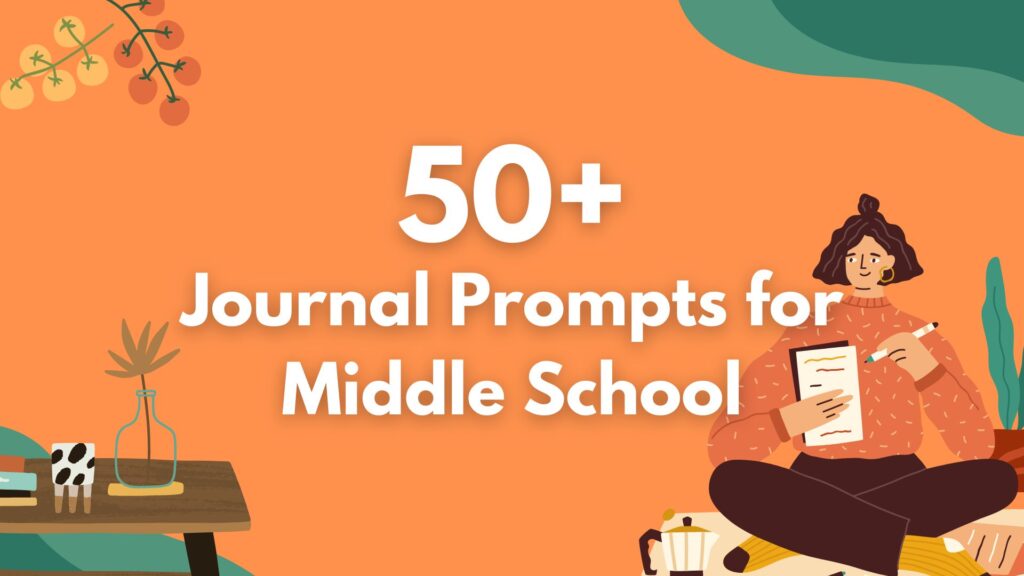
Middle school is a time of significant growth and discovery. Journaling is an exceptional way for students to express themselves, reflect on their experiences, and explore a multitude of topics. This extensive list of 50 journal prompts for middle school caters to a wide range of interests, encouraging middle schoolers to delve into creative, reflective, and personal writing.
Daily Reflections and Personal Growth
- Mindfulness Moments: Start your day with a mindfulness exercise and journal about the experience.
- Dream Diary: Record and interpret a recent dream.
- Gratitude List: Write about three things you’re grateful for today.
- Overcoming Challenges: Describe a challenge you faced and how you overcame it.
- Emotional Check-in: How are you feeling today? Explore your emotions in detail.
- Personal Goals: Set a goal for the week and outline the steps to achieve it.
- Self-Reflection: What are three words that describe you and why?
- New Beginnings: Write about starting something new or a change in your life.
- Favorite Memories: Recall and describe your favorite childhood memory.
Educational and Creative Exploration
- Science Wonders: Write about a recent science experiment and what you learned.
- Historical Time Travel: If you could go back to any historical period, where would you go and why?
- Literary Journey: Create a new ending for your favorite book.
- Artistic Inspiration: Describe an artwork you love and how it makes you feel.
- Nature Observation: Spend time in nature and write about your observations.
- Technology and Future: Imagine a new invention that could change the world.
- Exploring Space: If you could visit any planet, which one would it be and why?
- Poetry Creation: Write a poem about your feelings or a recent experience.
- Cooking Adventures: Document your experience of trying a new recipe.
Social Connections and Community
- Friendship Qualities: Write about what friendship means to you.
- Family Traditions: Describe a family tradition and its significance.
- Community Service Ideas: Think of a way to improve your community and plan it out.
- Cultural Awareness: Research a culture different from yours and write about what you learned.
- Role Models: Write about someone you admire and why.
- Leadership Reflection: What qualities make a good leader? Do you see them in yourself?
- Global Issues: Choose a global issue and write about why it’s important to you.

Fun and Imaginative Scenarios
- Fantasy World: Create a fantasy world and describe its inhabitants and rules.
- Adventure Story: Write an adventure story set in your favorite vacation spot.
- Superhero Saga: Invent a superhero and describe their first adventure.
- Mystery Plot: Create a mystery story set in your school.
- Time Machine Trip: If you had a time machine, where and when would you go?
- Space Exploration: Describe an encounter with an alien species.
- Magical Powers: If you had a magical power, what would it be and how would you use it?
- Animal Conversations: Imagine you can talk to animals. What would they tell you?
- Dream Vacation: Plan your dream vacation. Where would you go and what would you do?
Personal Interests and Hobbies
- Music Playlist: Create a playlist of your favorite songs and explain why you chose them.
- Book Review: Write a review of the last book you read.
- Sports Analysis: Discuss a recent sports game you watched or played.
- DIY Projects: Plan a DIY project and detail the process.
- Hobby Exploration: Describe your favorite hobby and why you enjoy it.
- Movie Critique: Write a critique of the last movie you watched.
- Photography Project: Take a series of photos and write about what they represent.
- Cultural Foods: Explore a cuisine from a different culture and write about the experience.
- Fashion Trends: Discuss a current fashion trend and your opinion on it.
Reflections on Society and the World
- Environmental Conservation: Write about the importance of environmental conservation.
- Historical Figures: Choose a historical figure you admire and write about their impact.
- Social Media Influence: Reflect on the impact of social media on society.
- World Leaders: If you were a world leader, what changes would you implement?
- Future Careers: Explore a career you’re interested in and why it appeals to you.
- Global Travel: Write about a country you’d like to visit and why.
- Time Management: How do you manage your time for school and leisure?
Encouraging middle school students to engage in journaling not only helps develop their writing skills but also fosters emotional intelligence, creativity, and critical thinking. These journal prompts for middle school provide a diverse range of topics to inspire and engage young minds in meaningful and enjoyable writing exercises.
For more journaling tips, please visit Journaling for Emotional Wellness.
A fun middle school prompt could be: “If you could invent a new holiday, what would it be about, and how would people celebrate it?” This prompt encourages creativity and allows students to explore their imagination while considering cultural and social aspects of creating a holiday.
How do you brainstorm a middle school essay?
To brainstorm a middle school essay, start by identifying the main topic or question. Then, use techniques like mind mapping, listing, or the 5 Ws (Who, What, Where, When, Why) to generate ideas. Encourage students to think freely and write down all thoughts, no matter how outlandish they may seem. Grouping related ideas together can also help in forming a more structured outline for the essay.
What prompts are in the 5 minute journal?
The 5 Minute Journal typically includes prompts focused on gratitude, personal reflection, and setting intentions for the day. Examples include “I am grateful for…”, “What would make today great?”, and “Daily affirmations. I am…”. These prompts are designed to encourage positive thinking and mindfulness in just a few minutes each day.
What is a good age to start journaling?
Children can start journaling as soon as they are able to write, usually around the age of 5 or 6. However, it’s important to adapt the journaling practice to their developmental stage. For younger children, this might include drawing pictures or using single words or short sentences. As children grow older and their writing skills develop, they can move on to more structured and detailed journaling.
